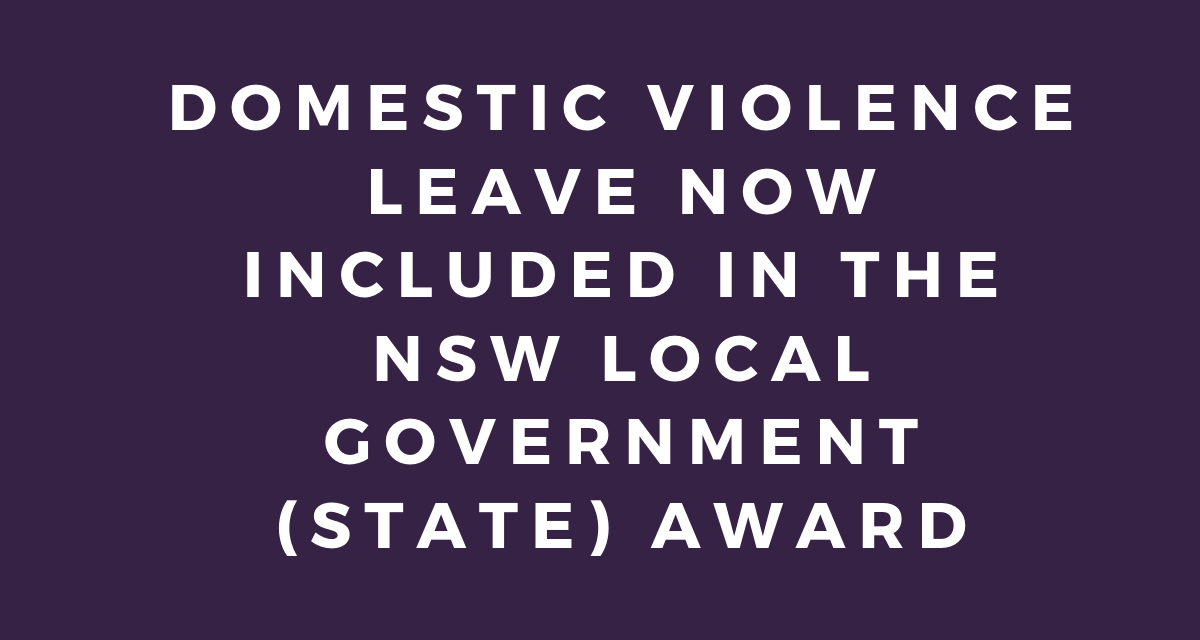The USU is proud to announce that on the 24th of February 2020, the Local Government (State) Award 2017 was varied via an award consent variation to include a Paid Family and Domestic Violence Leave clause. In late 2019 the LGNSW (employer’s conference) passed a motion to support the inclusion of Paid Family and Domestic Violence Leave into the Industry Award.
The USU could see no reason why we should wait to include this leave in the next Award, so we took action to seek a consent variation from the Award parties to the existing 2017 Award, so as to ensure access to this leave across all NSW Councils NOW rather than waiting to include it in the next Award.
This is a great achievement for the Local Government Industry which will benefit many workers, their families and their communities. It demonstrates to all that NSW Local Government and its Unions such as the USU are leaders in the ongoing fight against family and domestic violence.
This means that employees of local councils in NSW will have access to up to 10 days paid Family and Domestic Violence Leave each year provided by the NSW Local Government State Award.
This result was achieved through the dedication of the USU members and our allies in the community sector and the Local Government Industry in our We Won’t Wait Campaign.
This sends a strong message that the NSW Local Government industry will support employees who are experiencing Family and Domestic Violence.
NEW DOMESTIC VIOLENCE LEAVE CLAUSE BELOW:
FAMILY AND DOMESTIC VIOLENCE LEAVE
(i) Definitions
(a) In this clause:
- “family and domestic violence” means violent, threatening or other abusive behaviour, by a family member of an employee or another person living in the same household as the employee, that seeks to coerce or control the employee and that causes them harm or to be fearful.
- “family member” means:
(1) a spouse, de facto partner, child, parent, grandparent, grandchild or sibling of the employee; or
(2) a child, parent, grandparent, grandchild or sibling of a spouse or de facto partner of the employee; or
(3) a person related to the employee according to Aboriginal or Torres Strait Islander kinship rules.
(b) A reference to a spouse or de facto partner in the definition of family member in subclause (i)(a) of this clause includes a former spouse or de facto partner.
(ii) Entitlement to paid leave
- Subject to subclause (iii) of this clause, an employee, other than a casual employee, is entitled to up to 10 days’ paid leave to deal with the impact of family and domestic violence, as follows:
- the leave is available in full at the start of each 12 month period of the employee’s employment; and
- the leave does not accumulate from year to year.
- Casuals, whilst not eligible for paid leave under this clause, may make themselves unavailable for work without consequence to deal with the impact of family and domestic violence.
(iii) Taking paid leave
An employee may take paid leave to deal with family and domestic violence if the employee:
- is experiencing family and domestic violence; and
- requires flexibility to deal with the impact of the family and domestic violence.
Note: The reason(s) for which an employee may take leave include making arrangements for their safety or the safety of a family member (including relocation), attending urgent court hearings, or accessing police services.
(iv) Service and continuity
The time an employee is on paid leave to deal with family and domestic violence counts as service and does not break the employee’s continuity of service.
(v) Notice and evidence requirements
-
- Notice
An employee must give their employer notice of the taking of leave by the employee under this clause. The notice:
-
-
- must be given to the employer as soon as practicable (which may be a time after the leave has started); and
- must advise the employer of the period, or expected period, of the leave.
-
b. Evidence
An employee who has given their employer notice of the taking of leave under this clause must, if required by the employer, give the employer evidence that would satisfy a reasonable person that the leave is taken for the purpose specified in subclause (iii) of this clause.
Note: Depending on the circumstances such evidence may include a document issued by police, a court or a family violence support service, or a statutory declaration.





